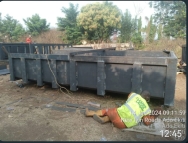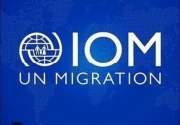
MTN Foundation engages stakeholders over challenges of substance abuse in Nigeria
By Bose Adelaja
CITIZENS COMPASS–From Agege to Iyana-Ipaja, Oshodi, Mushin, Ajah, Ikorodu, Ajegunle-Apapa, Ajegunle-Tollgate on the Lagos-Abeokuta Expressway, Ketu/Mile 12, Alimosho and several other suburbs in Lagos State, Nigerians have been witnessing a barrage of alarming and unusual behaviours being exhibited by some people of different age brackets.
This set of individuals, who are apparently under the influence of different kinds of substances always demonstrate some unusual and near-demented behaviors like letting off sounds like groaning, shouting, thrashing uncontrollably on the floor, showing acts of lunacy and engaging in fights and violence that alert people around that something has gone wrong somewhere.
Lying behind these saddening display is the effect and menace of substance abuse in the society.
In some suburbs in Nigeria, particularly in Lagos, all kinds of illicit drugs and substance are sold openly at some popular bus-stops without the slightest fear of the law, a situation which had defocused many Nigerians both young and old.
Also, in many places like joints, beer parlours, night clubs, it is common to see some Nigerian singers glorifying these deadly substances in songs. People currently call them many fanciful slangs like Loud, coke, ice, Canadian loud, colorado, sedative, Ref, stimulant, marijuana, coflin, kukuye, tramadol, cocaine, heroin to mention but a few.
The continuous use and abuse of these substances has destroyed many people psychologically or systematically, keeping some in isolation for years, though few are fortunate to be rehabilitated and reintegrated back into the society.
On Tuesday, June 11, 2024, MTN Foundation partnered the National Drug Law and Enforcement Agency (NDLEA) to organise a conference in Falomo area of Lagos where the menace was addressed.
The MTN Anti-Substance Abuse Programme (ASAP), featured various speakes like the Lagos State Commissioner for Youth and Social Development, Mr. Mobolaji Ogundele; Commander of Narcotics, NDLEA, Lagos State Command, Abubakar Liman Wali; Chairman, MTN Foundation, Prince Julius Adelusi-Adeluyi (OFR), among other key stakeholders.
The MTN Anti-Substance Abuse Programme is a multi-stakeholder and sectoral behaviour change initiative aimed at reducing the rate of first-time substance abusers amongst young Nigerians aged between 10 and 25 years.
In his opening remarks, Prince Julius Adelusi-Adeluyi (OFR), Chairman, MTN Foundation, emphasized the strategic importance and significance of the ASAP initiative.
He said, “Five years ago, we examined the dire situation and concluded that something had to be done about the menace of substance abuse. We felt it was time to address the problem beyond boardroom speeches, leading to the birth of ASAP. Drug abuse is a global phenomenon, but every nation must devise its own strategy to tackle its unique challenges. In Saudi Arabia, the approach is different; in America, in Asia, the responses vary. Nigeria must address its drug abuse problem independently. I am pleased with the Foundation for this initiative and especially thank to our major partners, the NDLEA and the UNODC, for their unwavering support over the years.”
Substance abuse remains a significant challenge, exacerbated by the high unemployment rates in Nigeria. According to a report from the National Bureau of Statistics (NBC), Nigeria’s unemployment rate surged to 5.0 per cent in the third quarter of 2023 from 4.2 per cent in the previous quarter. The report also adds that the labour force participation rate among the working-age population declined to 79.5 percent in Q3 compared to 80.4 percent in Q2. This economic challenge fuels the prevalence of drug abuse, as many youths turn to substance use as an escape from their harsh realities. Studies indicate that approximately 14.4% of Nigerians aged 15 to 64 use drugs, which is nearly three times the global average. This alarming statistic underscores the urgency for comprehensive intervention strategies.
Ogundele, who represented Lagos State Governor, Babajide Sanwo-Olu, highlighted the state’s commitment to tackling this issue. “In Lagos State, we have witnessed the devastating impact of drug abuse on families, communities, and the socio-economic fabric of our society.
This is why I am pleased to join the Board, the management of MTN Foundation, and other stakeholders at the MTN Stakeholder Conference to mark the International Day Against Drug Abuse. The theme of this year’s commemoration, ‘Breaking the Cycle; Effective Strategies for Preventing Drug Abuse Among Nigeria’s Youth,’ is not just timely but imperative. It also resonates deeply with our administration’s vision to safeguard the future of our nation. I appreciate MTN Nigeria, who, through its MTN Foundation and in collaboration with stakeholders, launched the ASAP initiative. Thank you for aligning with our administration in our goal of building a greater Lagos,” he said.
Commenting on the strategic partnership between the MTN Foundation and the Lagos State Government, Odunayo Sanya, Executive Director, MTN Foundation, stated, “We are grateful for our partnership with Lagos State. Lagos is unique; it is the economic nerve center of Nigeria, and initiatives implemented here have the potential to be replicated across the entire country. This collaboration allows us to work together on effective policies to combat substance abuse.”
The MTN ASAP stakeholder conference highlighted the importance of collective action and evidence-based strategies in combating substance abuse. The event underscored the necessity for increased investment in prevention efforts, advocating for collaborative approaches to tackle this multifaceted issue.
The Conference with theme: “Invest in prevention”, urged the participants to see substance abuse as a matter of emergency, as Adetunji Faith Adeola, a corp member from the Nigerian Institute of Medical Research and Dr Kemi Ogunyemi, the Student Union President, Landmark University, among other speakers did justice to the conversation.







